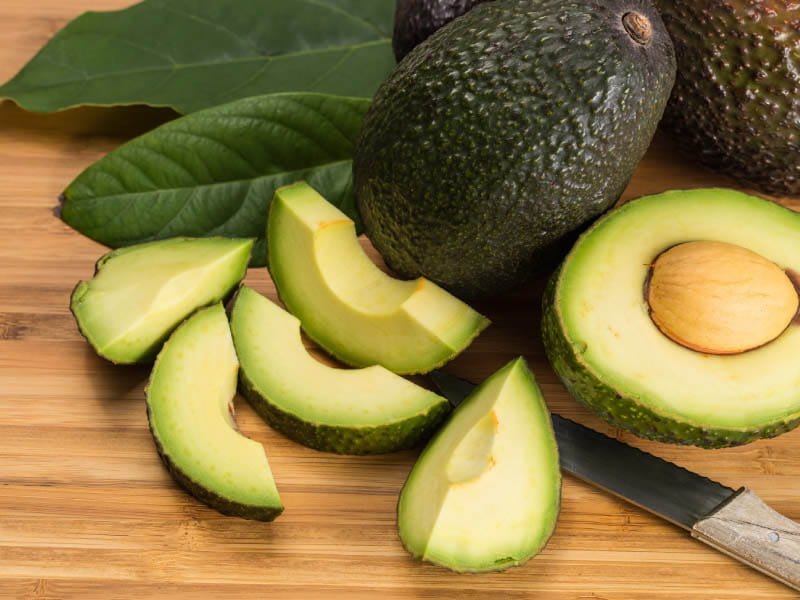
Avocados are a concentrated source of healthy fats, fiber and key nutrients like magnesium, vitamin C, folate and potassium. One-third of an avocado provides 10 percent of the DV for potassium, which supports heart health and helps regulate blood pressure.
They also have soluble and insoluble fiber, which helps keep bowel movements regular and may help prevent constipation. In addition, eating a diet rich in dietary fiber helps people maintain a healthy weight and lower their risk for obesity and type 2 diabetes.
1. Lowers Blood Pressure
While many of us were just beginning to embrace avocado toast and tacos, researchers were already discovering some of the fruit’s surprising health benefits. Avocados are rich in potassium, which helps regulate blood pressure. According to a 2022 study published in the Nutrition Journal, people who consume more of the mineral have a lower risk of high blood pressure. Half of an avocado provides around 10% of the daily value (DV) for potassium. Avocados also contain lutein and zeaxanthin, which are plant compounds that protect against cataracts and macular degeneration.
While they’re not low in calories, avocados are a good source of heart-healthy fats, especially monounsaturated fatty acids (MUFAs), which don’t raise LDL cholesterol levels. Studies show that replacing saturated and trans fats in the diet with MUFAs can help reduce blood cholesterol levels, which is especially important for those with diabetes or pre-diabetes. MUFAs are also key for maintaining healthy weight and reducing visceral fat, which can lead to metabolic syndrome. Adding avocado to your meals can also improve digestion, thanks to its fiber content and abundance of prebiotics.
2. Lowers Cholesterol
Avocados are loaded with healthy fats, including monounsaturated fats and polyunsaturated fats. They also contain vitamin E and potassium. These nutrients, along with other plant compounds, can help lower your cholesterol levels. Avocados also have a low saturated fat content. Saturated fats found in animal products like meat and butter can raise your bad cholesterol.
In a study, researchers found that eating one avocado per day lowered participants’ oxidized LDL, or “bad” cholesterol, when compared to those who did not eat the avocados. Other studies have shown that eating avocados can lower cholesterol and blood pressure.
A half-cup of guacamole contains about 200 calories. Make sure you stick to a serving size that fits into your overall calorie and fat intake.
Avocados provide around 14 grams of fiber. This nutrient is important for digestive health and helps you feel full. A study found that people who ate avocados regularly had higher levels of the bacteria in their gut called Faecalibacterium and Lachnospira, which produce short-chain fatty acids like butyrate. These fatty acids can help reduce inflammation and prevent certain types of cancer, such as colon cancer.
3. Fights Inflammation
Avocados are high in monounsaturated fats, which help reduce inflammation and control blood sugar levels. They also provide dietary fiber to support digestive health and promote regularity.
One-half of an avocado provides the body with a generous supply of vitamin C and vitamin E. These nutrients are antioxidants that may play a role in reducing inflammation and slowing the progression of atherosclerosis (clogged arteries).
The plant compounds lutein and zeaxanthin, found in avocado, protect your eyes from damage from the sun’s UV rays. Research suggests that eating a diet rich in these plant compounds can help decrease your risk of developing cataracts and macular degeneration.
Avocados are a good source of omega-3 fats and contain more potassium than bananas, making them an excellent choice for people who need to manage their sodium intake or lose weight. They are also an excellent source of vitamins A, K and C, folate, niacin, pantothenic acid, choline, vitamin B-6, riboflavin and vitamin D. The dietary fiber in avocado can promote bowel health, lower cholesterol and reduce the risk of heart disease, diabetes and obesity.
4. Lowers Risk of Cancer
Avocados are a powerhouse food. They’re rich in vitamins, minerals, fiber and healthy fats, according to the USDA. In fact, the fat content of avos — mostly monounsaturated fats — can help lower LDL “bad” cholesterol and reduce blood triglycerides.
In addition to a good dose of heart-healthy fat, avocados contain potassium, which is important for lowering high blood pressure and is sorely lacking in the typical American diet, per the Cleveland Clinic. A single avocado has almost half of the recommended daily value (DV) for potassium.
Avocados also offer a significant amount of omega-3 and omega-6 fatty acids. The latter are considered essential fatty acids because the body can’t produce them on their own. Regularly eating foods containing omega-3 and omega-6 fats can help reduce inflammation, protect against heart disease, promote normal growth and development and support brain function.
5. Helps You Lose Weight
Avocados are creamy, luscious, and can make almost anything taste better. While they have a lot of calories, the fat in them is heart-healthy monounsaturated fatty acids. These fats help lower cholesterol without impacting good HDL cholesterol levels. They also reduce inflammation, improve skin health, and boost metabolism.
Plus, they have a ton of nutrients. One avocado provides you with vitamin C, potassium (more than a banana), folate, and dietary fiber. Folate is necessary for pregnant women, and potassium helps regulate blood pressure and reduce the risk of kidney stones.
Adding a whole avocado to your lunch can help you feel full for hours. And in a small study, people who replaced some of the carbs in their meals with avocado calories reported feeling more satisfied and ate fewer calories overall than those who didn’t add the fruit to their meal.